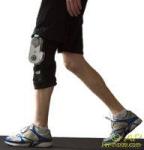
Researchers at a Canadian University recently invented a
device that would harvest energy from a walking person. The device is like an
orthopaedic knee-brace that tucks behind a person’s knee. The walking motion
will drive a set of gears which turn a small generator. Researchers hope that
this ‘energy harvester’ can charge up batteries and power cell phones, where
batteries are expensive and electricity is not readily available.
As our society develops technologically, we have become more and more dependent
on energy. Global warming, high fuel costs and environmental concerns have
generated multiple interests in alternative energy generation, for example, in
bio-fuel, wind and solar energy. These projects are all large-scale and some
have become controversial. Bio-fuel, for instance, has been linked to soaring
global food prices because of the scarcity of land and resources used to produce
the fuel.
Within this framework, simple technologies become more attractive; wind-up
technology, seen in clocks, flashlights and radios, where a person has to wind
up a device to generate power, are becoming increasingly popular. The new energy
harvester device is the latest of these more simple technologies.
Technology is a tool and the objective is to make living more efficient and
effective. If in this quest we become technologically dependent, blind to
impacts on the environment and the human being, we have become smart but not
intelligent.
Predominant characteristics of simple technologies are the generation of energy
for one’s own use, and the fact that these energies are reliable and renewable.
In the near future, this may be a lesson that we may have to relearn: Those who
will thrive in life are those who are able to sustain themselves in all aspects
of life; for the most powerful and reliable energy comes from within the human
being, when there is determination in the mind, love in the heart and
intelligence in action.